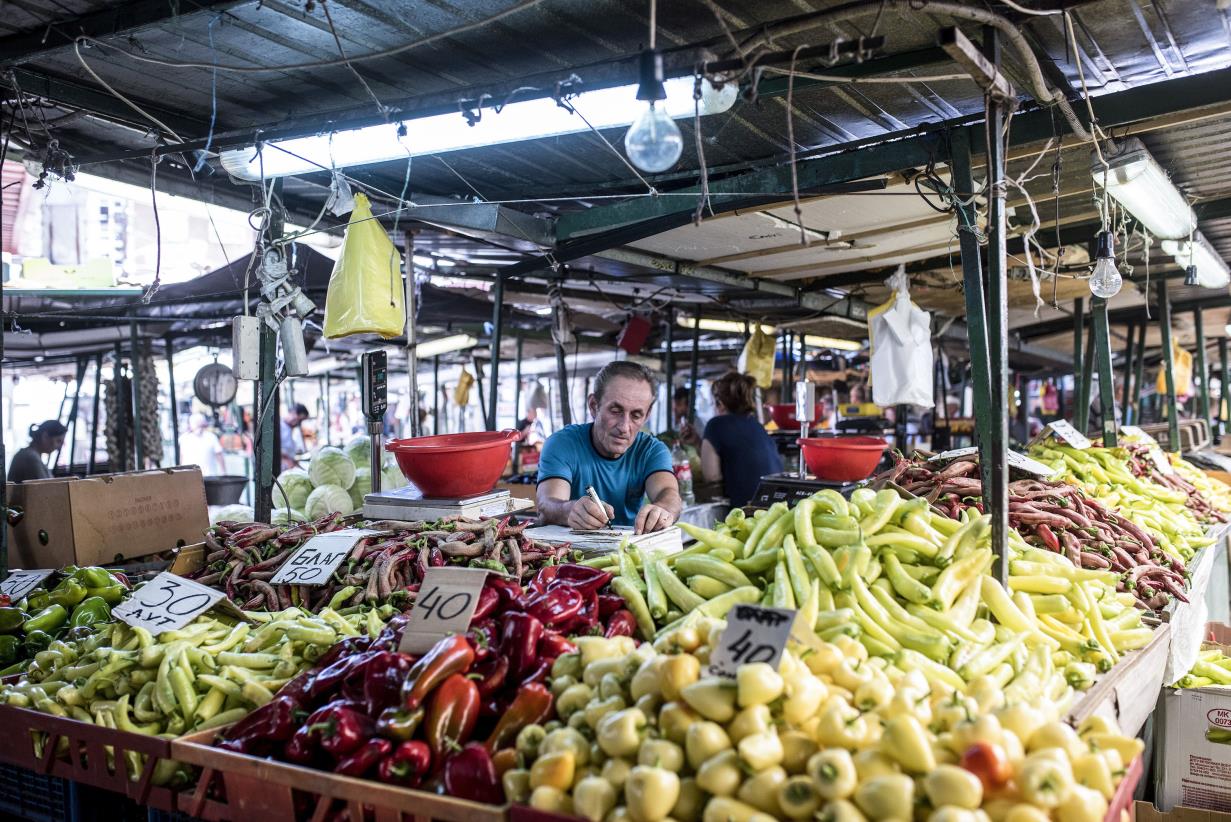Healthier diets will help curb the spread of non-communicable diseases
Rethink food systems to improve access to quality food, says FAO Deputy-Director General Maria Helena Semedo

Fresh fruit and vegetables at a market in Skopje.
©Photo: ©FAO/Robert Atanasovski / FAO
27 September, New York - While world hunger rose in 2017 for a third consecutive year, we are also observing an unprecedented rise in overweight, obesity and diet-related non-communicable diseases, FAO Deputy Director-General Maria Helena Semedo said today.
Speaking at the Third High-Level Event on Non-Communicable Diseases taking place on the side-lines of the UN General Assembly, Semedo sounded the alarm on the need to reverse current trends where more than one in every eight adults in the world is obese and over 38 million children under five are overweight.
"Today we are witnessing the globalization of obesity," said Semedo. "Our increasingly poor diets have become one of the major risk factors of premature adult deaths."
Unhealthy diets are closely linked with non-communicable diseases - which include heart attacks, strokes, cancers and diabetes - and contribute to six of 10 the risk factors of the Global Burden of Disease. Not only do non-communicable diseases cause human suffering, they hinder economic and social development, derail GDP, weigh heavily on health care costs and contribute to poverty. Equally worryingly, non-communicable diseases disproportionately affect people in low- and middle-income countries.
Rethinking our food systems, revamping our diets
Food and agriculture can play a major role in preventing non-communicable diseases by improving our food systems for better access to healthy diets. Food systems determine the quantity, quality, safety, diversity and nutritional value of the foods we eat.
Yet, today's global food markets have given rise to products that are very energy-dense and high in fat, sugar and salt. These foods are often cheaper, more readily-available and easier to prepare than fresh food.
"We urgently need to rethink our food systems and food environments and make healthy, nutritious foods affordable for everyone," said Semedo.
National agriculture and investment policies should include incentives for sustainable food systems that provide cheap, healthy foods. These should be double duty actions where programmes and policies simultaneously address undernutrition, overweight, obesity and diet-related non-communicable diseases.
Moving ahead on the UN Decade of Action on Nutrition
FAO is committed to eliminating all forms of malnutrition - including overweight and obesity - as part of the vital equation to achieving Zero Hunger. However, non-communicable diseases threaten progress towards the 2030 Agenda for Sustainable Development.
When the UN General Assembly declared the UN Decade of Action on Nutrition in 2016, it offered a unique opportunity for countries to blaze the trail in reforming their food systems to create affordable, healthy food environments. To put in place incentives for producers and retailers to grow and sell fresh fruits and vegetables, reducing those for processed foods with saturated fats, trans-fats and free sugars, and encouraging accurate labelling in line with Codex Alimentarius Commission guidelines.
"Now we have eight years left to galvanize high-level political attention and concrete action on nutrition," said Semedo. Lauding Norway's role as a frontrunner in establishing an action network on food from oceans and inland waters for improving food systems, she encouraged others to also create networks. All stakeholders across all sectors - from policy-makers to farmers to health and finance institutes to consumers - must be involved to overhaul and reshape food systems in order to reduce and reverse current risks of non-communicable diseases.
Exploring ways to better respond to the growing threat of non-communicable diseases, Semedo also spoke at the Friends of the UN Inter-Agency Task Force on the Prevention and Control of Non-communicable Diseases (NCDs) A Platform for Member States and the UN System to achieve the NCD-related Sustainable Development Goals targets, organized by the Russian Federation, reinforcing FAO's engagement and commitment to supporting countries and working with other partners to help move the NCD prevention agenda forward.
Contact
Bryce Seockhwan Hwang FAO-UN Liaison Offic (New York (+1 917) 367-8242 [email protected]
